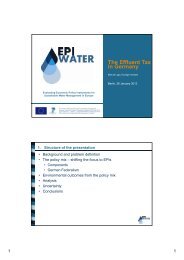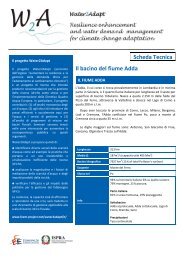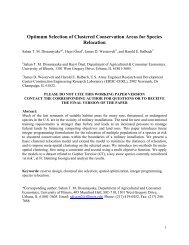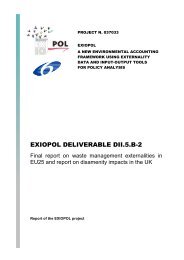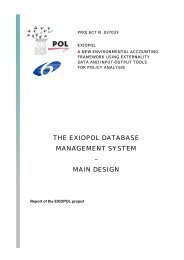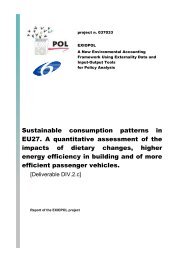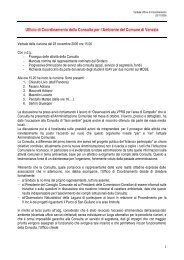Gulf and European Energy Supply Security - Feem-project.net
Gulf and European Energy Supply Security - Feem-project.net
Gulf and European Energy Supply Security - Feem-project.net
You also want an ePaper? Increase the reach of your titles
YUMPU automatically turns print PDFs into web optimized ePapers that Google loves.
<strong>Energy</strong> <strong>Security</strong>: Potential for EU-GCC Cooperation<br />
Taxation Policies<br />
Export taxes are a tool not only to extract at least<br />
part of the rent generated by oil <strong>and</strong> gas production,<br />
but also to favor domestic consumers by creating<br />
a differential between domestic <strong>and</strong> international<br />
prices. When it comes to oil, an export tax is a very<br />
rudimentary form of taxation <strong>and</strong>, accordingly, is<br />
rarely used.<br />
The most important <strong>and</strong> widely debated case<br />
of export taxes on crude oil exports is that of the<br />
Russia Federation. Export taxes on crude oil also<br />
exist in Argentina <strong>and</strong> Vietnam. China has had an<br />
export tax on offshore oil produced by foreign joint<br />
venture partners since 2006. Kazakhstan imposed<br />
an export tax on crude oil in 2003, but abolished it as<br />
of January 2009. The Russian export duty has been<br />
identified as a disincentive to exp<strong>and</strong> production.<br />
Oil companies lack stimulus to increase production<br />
because of the high tax burden. Oil export duties<br />
are still a very important source of revenue for the<br />
Russian state treasury, providing for more than half<br />
the oil <strong>and</strong> gas revenue of the federal budget, <strong>and</strong>,<br />
therefore, about one-fifth of all budget revenues.<br />
In the longer run, it is likely that export taxes <strong>and</strong><br />
duties on crude oil will be substituted for by other,<br />
more effective <strong>and</strong> less distorting forms of taxation.<br />
Exports may be restricted because the government<br />
pursues a market intervention strategy (whatever the<br />
target of the same) <strong>and</strong> modulates exported volumes<br />
in order to achieve certain price objectives.<br />
The obvious case is collective action by OPEC<br />
to impose <strong>and</strong> modulate quotas. OPEC quotas are<br />
imposed on total production, not on exports – but<br />
in fact the determination of quota levels is primarily<br />
influenced by international market conditions <strong>and</strong><br />
accumulation of stocks, <strong>and</strong> domestic requirements<br />
are added to whatever is believed to be the optimal<br />
volumes of crude oil to be added to the market.<br />
Non-OPEC oil exporters may also place<br />
restrictions on exports in cases of severe weakness<br />
in oil prices: they are then “encouraged” to align<br />
themselves to OPEC practices either explicitly or<br />
implicitly.<br />
Domestic Pricing Policies<br />
It is very common for oil <strong>and</strong> gas producers<br />
– indeed, for a large number of developing countries<br />
– to enforce domestic prices which are lower than<br />
international prices.<br />
The problem might not exist if international prices<br />
were more stable <strong>and</strong> increased only gradually. But<br />
the wide swings <strong>and</strong> price explosions as experienced<br />
in the first half of 2008 are difficult to pass on to<br />
domestic consumers in countries which export the<br />
vast majority of their oil <strong>and</strong> gas. As hydrocarbons<br />
are generally sold by government-owned entities,<br />
increasing domestic prices will shift purchasing<br />
power from the population to the government at a<br />
time when the latter is likely to be already flush with<br />
cash.<br />
Obviously, artificially low domestic prices<br />
will tend to result in relatively higher dem<strong>and</strong>,<br />
discouraging conservation <strong>and</strong> the efficient use of<br />
energy as well as the development of alternatives.<br />
All of the above are in prominent display in many<br />
developing countries, notably the oil producers.<br />
The use of lower domestic prices as a tool<br />
for encouraging industrialization <strong>and</strong> economic<br />
diversification is, however, a separate matter <strong>and</strong><br />
is quite more defensible than enforcing low prices<br />
to the final consumer. Offering low-cost inputs is<br />
a valid <strong>and</strong> effective industrial <strong>and</strong> development<br />
policy, <strong>and</strong> has yielded excellent results. The impact<br />
of this policy on global energy supplies is minimal,<br />
<strong>and</strong> concerns about security of supply do not offer a<br />
valid reason for criticism.<br />
Conclusions on Restrictions on Exports<br />
Our analysis has shown that restrictions on<br />
exports are widespread <strong>and</strong> take multiple forms.<br />
The problem is more acute for natural gas, but<br />
domestic dem<strong>and</strong> may be favored over exports<br />
also in the case of oil <strong>and</strong> oil products. All forms<br />
of restrictions are, in a sense, a threat to security<br />
of supply, because they result in lower production<br />
<strong>and</strong> exports ceteris paribus. Depending on one’s<br />
view of available resources <strong>and</strong> of the likelihood<br />
of supplies peaking because of the physical<br />
<strong>and</strong> technological impossibility of maintaining<br />
production, the fact that production is lower than<br />
might otherwise be the case shall be considered<br />
good or bad. Some view high oil <strong>and</strong> gas prices as




